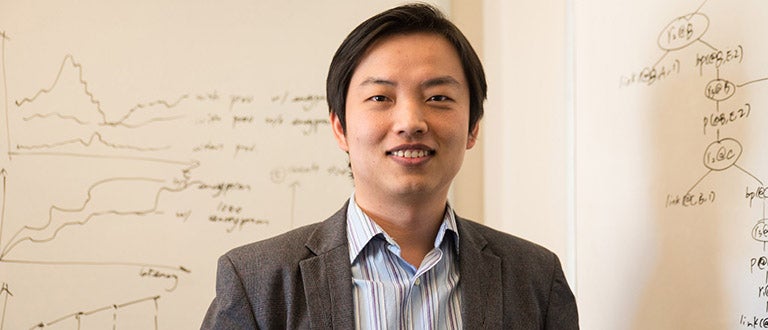Computer Science Faculty Develops New Cyber Defense

Assistant Professor of Computer Science Wenchao Zhou will lead a DARPA-funded research project aiming to build more effective defenses against DDoS attacks. Photo by Tess O’Connor.
June 6, 2016 — The computer science department at Georgetown College is about to help formulate defenses against one of the most common and effective forms of cyberattack.
Wenchao Zhou, Micah Sherr, and Clay Shields, all members of the computer science faculty, have received a three-year, $1.7 million grant from the Defense Advanced Research Project Agency (DARPA) to study defenses against distributed denial of service (DDoS) attacks on computer systems. DDoS attacks exhaust and paralyze network-based services by making repeated requests from multiple geographic locations.
Part of a $3.5 million collaborative effort led by the University of Pennsylvania, the research project focuses on designing and implementing radically new defenses — a necessity due to the troublesome nature of the approach.
“DDoS attacks are notoriously difficult to defend against given the heterogeneity and distributed nature of the attack,” Zhou said.
The project proposes a new platform for the type of service often targeted — cleverly named DeDOS, for “Declarative Dispersion-Oriented Software.”
According to Zhou, DeDOS splits the type of monolithic software usually susceptible to DDoS attacks into many separable “minimal splittable units,” or MSUs.
“Service replication and migration can be performed at a much finer granularity, and resources can be precisely added when and where needed,” Zhou said.
In layman’s terms, this means that the processes that grind to a halt when a network-based service falls victim to DDoS would be able to continue functioning through smaller units as needed.
“DeDOS is a game-changing technology that provides tailored responses to network attacks.” Sherr said. “It transparently and efficiently replicates only the network components that are under attack, providing far greater and far faster resistance to denial-of-service than existing methods.”
Shields noted that the research on the new platforms will be challenging — after all, DDoS has been a popular method of cyberattack for decades because it’s so difficult and expensive to create a large system with nimble enough resource management to delegate tasks when presented with an overwhelming number of requests.
“This presents some very interesting research challenges,” Shields said. “We need to be able to determine how and when to replicate software components with a minimal cost. We also need to determine where those components will run to preserve the overall amount of resources available. These are open questions that must be settled to develop an effective defense.”
— Patrick Curran